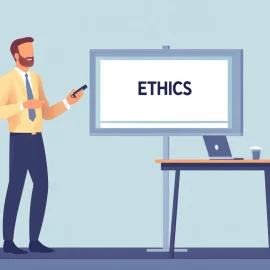

This article is an excerpt from the Shortform book guide to "Wanting" by Luke Burgis. Shortform has the world's best summaries and analyses of books you should be reading.
Like this article? Sign up for a free trial here.
What causes chronic dissatisfaction both personally and in society at large? What are some ways to overcome it?
In Wanting, author Luke Burgis argues that most of our desires in society are inauthentic. According to the theory of “mimetic desire,” we’re hardwired to pursue false desires because we mimic what others in society want, leaving us chronically dissatisfied.
Read on to learn more about the causes of chronic dissatisfaction and how to overcome it, according to Burgis.
Origins of Chronic Dissatisfaction
Wanting author Luke Burgis explains that “mimetic desire” can compel you to chase misleading desires (we call these desires misleading because they seem appealing at first, but they’re unsatisfying in the long run), which leads to chronic dissatisfaction over time. In his book, he defines mimetic desire as imitating what other people want or have. However, Burgis argues that increasing your awareness of mimetic desire will empower you to pursue life’s most meaningful desires and improve your overall satisfaction in life.
For instance, imagine several of your friends have gotten surgery to reduce their wrinkles. Mimetic desire drives you to do the same. However, years later, you notice you’re no less critical about your appearance than you were before surgery. You regret your decision to get surgery and realize you were driven by a misleading mimetic desire. You didn’t need to get rid of your wrinkles—you needed to get rid of your unrealistic beauty standards.
(Shortform note: Whereas Burgis defines misleading desires based on their impact—they lead to chronic dissatisfaction—other self-help authors define misleading desires based on the intentions behind them. For instance, in The Courage to Be Disliked, Ichiro Kishimi and Fumitake Koga claim that your desires are misleading if it’s your intention to make others like you. They claim that you’ll never be able to satisfy this intention because you can’t control what others think of you. A benefit of this definition of misleading desires is that it doesn’t rely on your ability to accurately predict your future satisfaction, as Burgis’s definition does. A downside of Kishimi and Koga’s definition is that it can be challenging to reshape your intentions.)
Burgis elaborates that we’re more likely to pursue misleading desires when we’re unaware of how mimetic desire operates. According to Burgis, companies’ success with advertising illustrates this concept. Companies use models (including literal models—fashion models) to make their products and services attractive. Mimetic desire compels you to purchase what they’re selling, and you don’t stop to question whether you really want what you bought. In other words, companies turn a profit by taking advantage of your lack of awareness of how mimetic forces contribute to chronic dissatisfaction.
(Shortform note: In Nudge, Richard Thaler and Cass Sunstein share Burgis’s perspective that people in power (such as advertisers and marketers) shape our desires and choices—however, they portray this influence in a more positive light. Thaler and Sunstein argue that people in power (such as marketers) can “nudge” others (such as consumers) toward making good, healthy decisions. For instance, an insurance company might leverage mimetic desire to “nudge” consumers to enroll in health care—a choice that’s arguably good for both individuals and society. The insurance company could accomplish this by hiring a well-known, attractive celebrity to model the enrollment process in a commercial.)
Effects on Society
The negative effects of mimetic desire also extend beyond individuals. According to Burgis, mimetic desire causes chronic dissatisfaction within society. When mimetic forces drive many people to prioritize misleading desires over meaningful ones, society suffers.
For example, mimetic desire compels many people to continually update their wardrobes with trendy styles. This is a misleading desire: The joy of having a trendy wardrobe is short-lived because it’s not long before new trends replace old ones. Since so many people care about trendiness, large-scale societal problems exist. For instance, the competitive nature of the clothing industry motivates companies to pay their workers low wages. Additionally, the clothing industry is responsible for carbon emissions and waste that threaten the planet’s health.
| Who’s to Blame When Large Groups Pursue Misleading Desires? Burgis’s claim that mimetic forces can drive many people to pursue the same misleading desire raises the following question: Who’s to blame when large numbers of people pursue a misleading desire, leading to widespread, chronic dissatisfaction? Some experts might answer this question by claiming that we should blame human nature and biology. According to this view, because brains are flawed, we make poor decisions about which desires to pursue. For instance, in Decisive, Chip and Dan Heath argue that our brains are wired to make poor decisions because we possess many biases, such as a bias for maintaining the status quo. These biases often cause us to prioritize our short-term satisfaction (misleading desires) over our long-term fulfillment (meaningful desires). By contrast, other experts might answer this question of blame by emphasizing how economic and political systems cause people to pursue misleading desires. For example, in The Paradox of Choice, Barry Schwartz claims that today’s market democracies offer us an overabundance of choices, making us feel overwhelmed when making decisions. As a result, we easily make poor choices (such as the choice to pursue a misleading desire) because we don’t have the time or mental energy to thoroughly consider other options. |
Solution: Pursue Meaningful Desires
To cope with chronic dissatisfaction, Burgis claims that models can inspire you to pursue meaningful desires. In contrast to misleading desires, meaningful desires involve long-term investment and provide long-term satisfaction, which will ultimately help you to overcome short-lived, chronic dissatisfaction. Examples of meaningful desires include forming supportive relationships, playing a crucial role in a civil rights organization, and deepening your connection with nature.
(Shortform note: If Burgis’s explanation of meaningful desires feels vague, try incorporating the ideas of other experts who provide advice on chasing fulfilling goals. In The Happiness Hypothesis, Jonathan Haidt specifies two types of desires that provide lasting fulfillment and are therefore meaningful according to Burgis’s definition. First, Haidt argues that people feel most fulfilled when they’re working on a project that’s challenging and aligns with their skillet. For instance, if you’re a guitarist, making a record will provide long-term satisfaction. Second, Haidt argues that reciprocal, joyful relationships with others are a key component of fulfillment. For instance, reconnecting with your grandparents might provide you with long-term satisfaction.)
Meaningful Desires Improve Society
Burgis elaborates that fulfilling meaningful desires improve society (in contrast to pursuing misleading desires, which harms society and creates widespread, chronic dissatisfaction). For instance, consider the pursuit of knowledge—it’s a meaningful desire because it’s a long-term goal that provides long-term fulfillment. You might notice that your colleague’s advanced degree equips them with valuable knowledge, and mimetic desire might drive you to increase your knowledge by getting a degree, too. When many people pursue the desire to increase their knowledge, it leads to new discoveries that deepen our understanding of the world.
(Shortform note: Burgis suggests that when large numbers of people pursue meaningful desires, it’s always good for society—however, what some people consider meaningful is subjective and may not necessarily be positive for others. For example, proponents of colonialism claim that colonizing less-developed countries is a long-term investment that improves the lives of the colonized by “civilizing” them. This fits Burgis’s definition of a meaningful desire. However, opponents of colonialism argue that it harms society by oppressing people in colonized territories and robbing them of personal agency. In other words, colonizers’ “meaningful desire” to colonize is harmful, rather than meaningful, to victims of colonization.)

———End of Preview———
Like what you just read? Read the rest of the world's best book summary and analysis of Luke Burgis's "Wanting" at Shortform.
Here's what you'll find in our full Wanting summary:
- Why we want the things that we want
- How our desires are influenced by what other people want or have
- Strategies for living a more meaningful life by taking control of what we want






